View a PDF version of this document.

Message from the Executive Director

Thank you for taking the time to review the Ethics Commission’s Annual Report for Fiscal Year 2024. This year saw many exciting milestones for our agency. In March, voters resoundingly approved the Commission’s Proposition D, with 89% voting in favor. This makes Proposition D the most popular San Francisco ballot measure in a generation. The measure modernizes many of the City’s most fundamental ethics rules, and the overwhelming support shown by voters confirms that San Franciscans care deeply about the integrity of their City government. This is as true now as it was when the voters first created the Ethics Commission by ballot measure in 1993. With one election done in March and another coming up in November, FY24 has seen a flurry of campaign finance work at the Ethics Commission. Staff have been busy improving public access to information, digitizing the last remaining paper filing processes, and administering the City’s public financing program in the only recent election to feature both mayoral and supervisorial contests. All of this work aims to provide San Franciscans with the clearest and most timely picture of how funds are spent on City elections and to empower candidates to run meaningful, competitive campaigns.
The Commission also enhanced its advice and guidance work in the past year, launching new online support portals, offering new trainings, and devoting more staff to providing advice. As a compliance agency, we are committed to ensuring helpful and timely answers to anyone who has questions about ethics rules.
This fiscal year also saw the full elimination of the remaining campaign audit backlog. Though much work remains to be done to fully modernize the Commission’s audits program, the elimination of the backlog and the approval of much needed budget support will let us continue that work in FY25.
Lastly, June 8, 2024 marked the 30th anniversary of the Ethics Commission’s first public meeting. In the years since then, the Commission has grown from a small office with limited duties to one of the leading government accountability agencies in the country. In the coming year, we look forward to continuing this progress and providing San Franciscans the meaningful transparency and accountability that they asked for 30 years ago.
Sincerely,
Patrick Ford
Executive Director
Mandate & Mission
What We Do
The Ethics Commission provides information, guidance, and training to city officers and employees, candidates for public office, lobbyists, and others to help them understand and comply with their responsibilities under the law. To fulfill its oversight mandate, the Commission is charged with ensuring fair, thorough, and timely investigations into possible violations of the City’s good government laws, including laws governing campaign finance and governmental conflicts of interest, and, where appropriate, pursuing enforcement actions that serve as an effective deterrent and promote accountability in government. It also conducts audits of campaign committees and lobbyists to determine whether they have materially complied with applicable requirements of State and local laws. The Commission is also responsible for raising public awareness of relevant laws, analyzing how well current laws are achieving their intended purposes, and formulating new regulatory and legislative approaches to ensure the City’s political reform laws are strong, workable, and enforceable. The Commission also administers a public campaign financing program which provides limited public financing for candidates for Mayor and the Board of Supervisors who meet established eligibility criteria.
With a sworn responsibility to the public trust, members of the Ethics Commission are pledged to a high standard of excellence in government accountability. Together with staff, the Commission works to effectively implement the laws and programs within its jurisdiction.
Organizational Structure
The Ethics Commission has five Commissioners, each of which is appointed by one of the Mayor, the City Attorney, the District Attorney, the Assessor, and the Board of Supervisors. The Commission elects its Chair and Vice-Chair annually. The Commission appoints an Executive Director, who in turn hires staff to assist in the day-to-day operations of the Ethics Commission.
Departmental Leadership
- Theis Finlev, Chair (Appointed by the City Attorney)
- Argemira Flórez Feng, Vice Chair (Appointed by the Assessor-Recorder)
- Yaman Salahi (Appointed by the Board of Supervisors)
- David Tsai (Appointed by the District Attorney)
- Karen Bell Francois (Appointed by the Mayor)
- Patrick Ford, Executive Director
- Gayathri Thaikkendiyil, Deputy Director & Chief Operating Officer

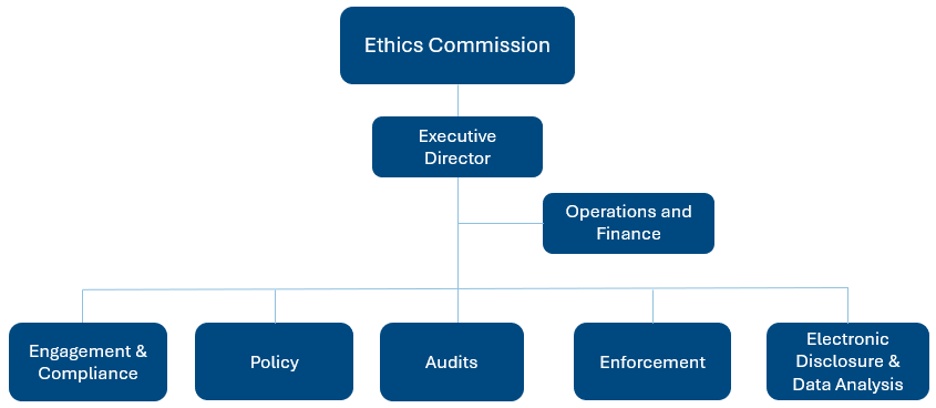
Major FY24 Projects
Each fiscal year, the Commission undertakes projects that will advance its mission and better achieve its mandates. This section highlights a number of projects that were undertaken or completed in FY24.
Proposition D
On March 5th, voters overwhelmingly approved Proposition D, which was placed on the ballot by the Ethics Commission in August of 2023. The approval of Proposition D was a major milestone in a project that has been the Commission’s top policy priority since 2020. The changes to City ethics rules brought by Proposition D will become operative on October 12, 2024.
Prop D Policy Development and Voter Approval
In 2020, following the announcement of criminal corruption charges against multiple City officers, employees, and contractors, the Ethics Commission began a review of the City’s conflict-of-interest rules as its top policy priority. This launched the Commission’s Government Ethics and Conflict of Interest Review project, which produced four staff reports published in 2020 and 2021. The recommendations from the last three of these reports were packaged as a ballot measure, which would become Proposition D.
The Ethics Commission had sought to place these reforms on the ballot in 2022, but were unable to do so due to a then-ongoing meet and confer process with the Municipal Executives’ Association (MEA). With support from the Department of Human Resources and the City Attorney’s office, the City successfully completed the meet and confer process. With this process concluded, the Commission was able to vote at its August 2023 meeting to place the reform measure before voters and approve associated regulations.
In the months between the Commission’s vote to place Proposition D on the ballot and the March election, Commission staff communicated factual information about Proposition D to help inform the public. This included supporting the work of the City’s Ballot Simplification Committee, which developed a digest about Proposition D. The Commission also submitted both a proponent argument for Proposition D and a rebuttal to the opponent argument that appeared in the Voter Information Pamphlet. Staff also published information about Proposition D on the Commission’s website and engaged with members of the public, journalists, and representatives from other City departments to answer questions about the measure. Proposition D was endorsed by numerous organizations and media outlets.
In March, more than 89% of voters supported Proposition D, making it the fifteenth most popular City measure ever approved by San Francisco voters (going back to 1907), and the single most popular City measure since 1993.
Implementation
The changes brought by Proposition D became operative on October 12, 2024. In order to ensure that the new laws are understood and followed by all City officers and employees, the Commission undertook a major implementation project during FY24 that will be completed in FY25. The major elements of the implementation projects are:
- Trainings and Outreach: Staff developed a 2-hour live training for both Department Heads and City Officials covering the changes to Ethics law that Proposition D will affect. Two training sessions were held each month from July 2024 through September 2024; the training sessions include both a presentation of pertinent information as well as a Q&A portion to address specific questions from attendees. In addition to these live training sessions, 4 hours of self-study material and a recorded version of the training are available on the Commission website to further enhance understanding of the changes Proposition D is brining. Staff also plan to conduct robust outreach to the affected members of the regulated community ahead of October 12.
- Creation of New Ethics Training Module: Staff across the agency are working together to implement a new Annual Ethics Training module for City Officers and Employees. This new module will utilize new technology and incorporate design principles to ensure the content presented is accessible and engaging.
- Development of Departmental Gift Disclosure Process: Staff are working to create a new disclosure form for gifts given to City Departments, with a goal of creating a simple, streamlined, and user-friendly process. The form creation process has involved testing and feedback from other departments to ensure ease-of-use for the end user.
- Standardization of Personal Relationship Disclosure: Proposition D will impose penalties on City officials who fail to disclose a personal relationship with someone who is involved in a government decision that the official is making. Staff are currently developing a form to make these required disclosures more standardized and streamlined to help City Officers and Employees more easily comply with this disclosure requirement and to better help the public access the disclosures.
- Development of Regulations: Staff has also continued work on additional regulations connected to Proposition D, specifically those clarifying the rules regarding incompatible activities. These initial draft regulations were first presented to the Ethics Commission in January 2024, and staff are currently meeting and conferring with the Municipal Executives Association over the proposed regulations. Staff is working to resolve this meet and confer and bring revised regulations back to the Commission for approval as early as possible.
City Elections in 2024
Calendar year 2024 includes two City elections: the March 5th primary and the November 5th general election. The March election included local races for party central committees and seven City ballot measures. The November election will be the first election held after the passage of Prop H in the November 2022 election. Prop H consolidated municipal elections in San Francisco to eliminate odd-year elections. Starting with the November 2024 election, voters will elect not only 6 seats on the Board of Supervisors (odd-numbered districts) but also Mayor, Sheriff, District Attorney, City Attorney, and Treasurer. This section highlights some of the initiatives undertaken by the Commission in connection with the two 2024 elections.
Trainings
The Commission also worked to improve and modernize the training offered to City candidates and treasurers ahead of the November general election. Two separate live trainings are now offered via Microsoft Teams, one for City Candidate-Controlled Committees and another for Primarily Formed & General Purpose Committees.
Staff developed a comprehensive training schedule and began conducting trainings at the end of May and will continue to offer sessions through early October. The days and times of these trainings are varied—including sessions offered in the evening—to make the trainings more accessible and convenient for attendees.
Engagement & Compliance Division staff also delivered a virtual training at the request of the California Political Treasurers Association during their annual conference. The presentation covered San Francisco-specific disclosure requirements and was adapted from the content of the newly revamped Candidate & Treasurer trainings.
Campaign Finance Workshop for Journalists
On February 15th, Ethics Commission Staff presented “SF Campaign Finance 101” to a group of more than fifteen local journalists. The event was organized by the Society of Professional Journalists – Northern California and hosted by KQED at their headquarters. This workshop presented an overview of the City’s campaign finance laws, demonstrated how journalists can access campaign finance data, and provided an opportunity for attendees to ask questions to Commission staff.
Local journalists and news outlets are some of the primary users of the campaign finance data the Commission collects and displays. Their use of this data in their coverage of elections is vital to helping the public understand how money is spent on local elections. Events like February’s workshop help these journalists, and the public, get the most benefit from the campaign finance disclosures through increasing understanding of the law and the Commission’s data systems. Workshops also serve as stakeholder engagement opportunities where staff can solicit feedback about how the Commission’s programs can be improved to better serve the community.
Campaign Finance Dashboards
The Commission continued to offer and enhance its campaign finance dashboards for the 2024 election cycle. The dashboards summarize and analyze the fundraising and spending in candidate and ballot measure races in San Francisco to help the public and the press understand the disclosures that campaigns file with the Commission.
For the March election, the Commission added a daily digest dashboard that provided a simplified view of fundraising and spending in each race. Unlike the full campaign finance dashboards, the daily digest dashboards update automatically.

In addition, the Commission added a new dashboard to track the activity of general purpose committees. These committees can often report in multiple jurisdictions and can be difficult for the public to track by reviewing financial statements or accessing public datasets. The new general purpose committee dashboard retrieves data from state and local databases to provide a simple, consolidated tool to track their fundraising and spending. This innovative tool is industry leading and has been under conceptual development for several years.

At the 2024 conference of the Council on Government Ethics Law in December, Staff will present the enhanced dashboards as part of a panel discussion showcasing innovative campaign finance data tools.
Public Financing Program
In every election in which there is a contest for Mayor or Supervisor, the Commission administers the City’s public campaign financing program. This program provides limited public financing to candidates who qualify by receiving a minimum number of contributions from San Francisco residents. The public financing program empowers candidates to run a competitive campaign while reducing the need to rely on large contributions. It also incentivizes more City residents to get involved in elections and make small political contributions.
Because of the consolidation of the Mayor’s race with the contests for six seats on the Board of Supervisors, the public financing program experienced significant activity in FY24 ahead of the November 2024 election. Already by June 30th, seventeen candidates had qualified for the program: fifteen supervisorial candidates and two mayoral candidates. In total, these seventeen candidates had already been approved for $2.7 million in public funds. Staff administer the program by reviewing applications, answering questions, and initiating payments.
Online Support Portals Launched
Two years ago, the Commission established an online support portal to allow Form 700 filers to request technical support and guidance. The portal gives filers a tool to review a preset list of common solutions to technical support and guidance questions. Where further assistance is required, users can open a support request, receive confirmation of receipt, track the progress of their request, and communicate with Commission staff. The Commission processed almost a thousand requests through the portal in the first two years. The portal also supports analytics features so that the Commission can track the volume, subject matter, and turn-around time of all support requests to ensure the quality of services.
Building on the success of the Form 700 support portal, the Commission expanded this feature in FY24 by creating additional online support portals for all other program areas, including campaign finance, ethics, campaign consultant, lobbying, permit consultant, and major developer.

Disclosure Program Enhancements
The Commission is committed to continuously improving user experience, increasing access for the public and regulated persons, and decreasing unnecessary compliance obstacles. In FY24, the Commission undertook two projects that leveraged technology to improve and modernize the administration of two disclosure programs while also maintaining the security and integrity of the systems administered by the Commission.
Signature Card Process Overhaul
In the last quarter of FY24, the Commission implemented a new electronic committee registration process that allowed the agency to retire the Signature Verification Card (SFEC Form 112a). This now-defunct form required either notarization or signing of the form in the presence of Ethics Commission staff in order to ensure the validity and security of signatures for public disclosure forms. This process was logistically difficult for both filers and Staff. Staff received stakeholder feedback regarding the existing process through ongoing engagement with filers and through two interested persons meetings.
Advances in electronic signature technology and changes in state law allowed the Commission to replace the Form 112a with a purely electronic process. This new process also allows for e-filing of both the Candidate Intention Statement (FPPC Form 501) and Statement of Organization (FPPC Form 410), which has significantly streamlined the registration process for filers in the campaign finance program.
E-Filing Established for Campaign Consultant Program
The Commission reviewed the Campaign Consultant Ordinance disclosure forms and developed new dynamic electronic forms that consolidate the existing paper disclosure forms from six to two forms. The forms will undergo testing in the first quarter of FY25 with an expected launch date of December 2024 to coincide with the 2025 registration period. Once the project is completed, the campaign consultant program will be the last of the Commission’s disclosure programs to be converted to full electronic filing.
Disclosure Program Administration
One of the Commission’s central mandates is to administer public disclosure programs. These programs provide crucial transparency into the intersection between money and City government, including campaign spending, lobbying, and the financial interests of government officials. The Commission endeavors to administer these programs in ways that achieve high compliance rates, reduce unnecessary barriers, and increase public access to information. The work of administering disclosure programs consists primarily of providing advice in response to questions, delivering trainings and written materials, and supporting users of the Commission’s electronic disclosure systems. This work is led by the Commission’s Engagement and Compliance Division. Below are highlights of the Commission’s disclosure program work during FY24.
Advice, Guidance, and Technical Assistance
The Engagement & Compliance Division made great strides in improving its capacity to provide advice, guidance, and technical assistance to the regulated community by leveraging new tools, processes, and systems to increase efficiency and transparency. This was accomplished through recruiting three new staff members, including a new manager of the division, and by refining and documenting the Division’s operating protocols.
Division staff resolved a total of 858 support requests across all programs. The majority of requests (740) were submitted through the Form 700 support portal, as it was the only portal in continuous use for the entirety of FY24. The Average Time to Resolution for tickets in all portals was 29.9 working hours (3.73 working days). Staff have made progress in appropriately resolving high volumes of questions with short turn-around times. Now that online support portals have been launched for all programs, as discussed above, the Commission will be able to track volume and response times for advice questions across all programs.
Staff also solicited feedback about the Commission’s advice program to gauge satisfaction and identify areas for improvement. Of the 99 customer satisfaction survey responses received, 90 (91%) were rated at 5-stars. Below is a sample of comments received with 5-star ratings:
- I got a very prompt response to my question and my problem was resolved very quickly!
- Extremely helpful, as always.
- As always, the ETH Team is exceptionally helpful and responsive. We sincerely appreciate your support!
The primary area for improvement identified through feedback was shorter response times, which is an ongoing goal for FY25.
Trainings
The Commission offers periodic trainings as an important way to remind regulated persons about their obligations under the law and to provide assistance. The Commission has been working on improvements to the various trainings conducted by the Division to make them more informative, engaging, and accessible.
Staff conducted a successful series of trainings and information sessions for both departmental filing officers and filers in the Form 700 Program. Using lessons learned from this year’s training program, Staff will be working through the summer and fall to create new content and improve the sessions for the 2025 annual filing process.
As mentioned above, improvements to the design and delivery of the mandatory training for candidates and treasurers was a major focus for the Engagement & Compliance Division during the second half of the Fiscal Year.
Staff plan to turn their attention to improving the training for Contact Lobbyists during the new Fiscal Year.
Compliance Resources – Website Improvement
In addition to answering advice questions and conducting trainings, the Commission also maintains extensive written compliance resources that are available on its website. These materials seek to explain the laws administered by the Commission in terms that are accessible to most readers. These materials include the Commission’s website content, candidate guides, and manuals.
In the second half of FY24, the Commission began a project to improve the user experience on the Commission’s website. Staff formed a Website Taskforce to study the website in its current form, analyze feedback about the website, recommend changes, and implement improvements. Recommended improvements included structural changes to make the website easier to navigate and content rewrites to make information more accessible. Taken together, these changes will make it easier for users of the Commission’s website to self-direct to desired information. The Commission plans to implement these changes in FY25.
Filing Compliance
Statement of Economic Interest (Form 700)
The Commission oversaw a busy annual filing period for the Statement of Economic Interest (Form 700) program. In total, 5,709 individuals were required to submit annual filings this year; comprising 5,240 designated employees in departments across the City government (Designated Filers) and 469 department heads, commissioners, and board members (Ethics Filers). The chart below summarizes on-time and current filing compliance rates as of June 30, 2024 for the 2024 Annual Form 700 filing:
| Filer Type | On-Time Compliance Rate | As of 6/30/24 |
|---|---|---|
| Ethics Filers | 91.68% | 99.57% |
| Designated Filers | 97.00% | 98.26% |
| All Filers | 96.57% | 98.37% |
Campaign Finance
The Engagement & Compliance Division staff received and processed 479 Form 460 disclosure statements from committees across the 4 filing deadlines that have occurred since January 1, 2024. These statements were received from candidate-controlled, primarily formed, and general purpose committees, as well as Major Donors. Of the 479, 452 (94.4%) were filed timely.
Lobbyists
The Lobbyist Disclosure program saw 30 new contact lobbyist registrations for CY24, bringing the total number of registered lobbyists to 234. There are also four expenditure lobbyists currently registered with the commission, with two newly registered this year. Staff have processed and reviewed 1,059 monthly reports from contact lobbyists and 11 monthly reports from Expenditure Lobbyists. The on-time compliance rate in this program remains strong, with 98.6% of all filings being submitted timely.
Quarterly Disclosure Programs
The commission administers three additional programs which report on a quarterly basis: the Campaign Consultant program, the Major Developer program, and the Permit Consultant program. These quarterly disclosure programs have a much lower filing volume than the three major programs administered by the agency. The average timely compliance rate in these three programs was 93.67% in FY24.
Additional Policy Initiatives
In order to ensure that San Francisco’s ethics laws are strong, enforceable, and workable in practice, the Policy Division studies emerging trends, assesses existing laws and programs, develops policy recommendations for the Commission to consider, and collaborates with the Commission’s other divisions to implement new and existing policies. The Commission’s policy work produces research, legislative recommendations, regulations, program concepts, and public-facing communications that seek to inform and strengthen the City’s pursuit of clean government.
Aside from Prop D, which was the Commission’s largest policy initiative of the year, as discussed above, additional policy initiatives were:
Campaign Finance Regulation Changes
In April, Staff presented amendments to the Commission regarding its campaign finance regulations. These regulation changes allow the Commission to institute a new process for accepting electronic signatures on documents, close a loophole that allowed those prohibited from making contributions to still hold fundraisers in their homes or offices, and clarify rules regarding the provision of documents to the Commission, committee bank locations, and how certain contribution information must be collected. The proposed changes were identified over the previous two election cycles as ways to simplify, streamline, and make more transparent the operation of the City’s campaign finance laws.
The Commission approved these regulation changes at its April meeting. Subsequently, Supervisor Ronen called for a hearing on the approved regulations and made a motion to veto the regulations regarding home and office fundraisers. Staff attended that hearing and sent a memo to the Board of Supervisors regarding the proposed regulations, which sought to address the questions and concerns raised during the hearing. When the item came before the full Board, Supervisor Ronen stated that the Staff memo sufficiently addressed her concerns and tabled the motion to veto the regulations. The regulations went into effect on June 11, 2024.
Form 700 Legislation
Staff collaborated with Supervisor Chan’s Office and the City Attorney’s Office to develop legislation that makes it easier for City departments to have their employees with purchasing authority under Proposition Q file their Form 700s. Proposition Q allows City department heads to delegate authority to certain City employees to approve purchases under $10,000 using City funds. Multiple conditions apply to the delegation and use of this authority, including that delegated “Prop Q” purchasers must file the Form 700. Staff provided a memo supporting the legislation to the Board in February. This legislation (File #240016) was unanimously approved by the Board of Supervisors on April 30 and became effective on June 10. In addition to updating and clarifying the process for Form 700 filers with Proposition Q authority, the legislation also made several non-substantive corrections to the Code. Commission staff communicated about this change to departmental filing officers before it went into effect.
Biennial Review of Form 700 Filers Lists
State law requires local governments to identify all officers and employees that participate in making governmental decision and to require these individuals to file the Form 700.[1] The law also requires that every public agency review and update this list of filers every other year. The Board of Supervisors last passed an ordinance amending the City’s COI Code in January of 2023, following the biennial review process that occurred in 2022.
Changes to the list of Form 700 filers may be needed when agencies restructure or when positions that participate in making governmental decisions change. The biennial review requirement helps ensure that agencies periodically review the lists of designated filers and ensure the disclosures required by those filers are appropriately tailored to the nature and scope of work they perform.
Commission Staff directly support the biennial review process in collaboration with the Board of Supervisors, the City Attorney’s Office, and the Department of Human Resources. Staff updated and published the Commission’s Guide to Departmental Review of Employee Form 700 Filer Lists for 2024 and are helping support other departments throughout this process. Departments were asked to submit their potential revisions to the Board of Supervisors by July 31, 2024. As of April, there were over 5,000 designated Form 700 filers in the City.
Legislative Affairs
In FY24, the commission played an active role in multiple policy processes at City Hall concerning government transparency and accountability. The Commission serves as a subject matter expert and a source of valuable data to help policymakers and other agencies understand and improve good government practices. This included liaising with the Board of Supervisors, the Mayor’s Office, the Civil Grand Jury, and numerous City departments.
Artificial intelligence Hearing
In May, Staff participated in a hearing to discuss the use of artificial intelligence in local elections and explore what the City could do to safeguard against such threats. The hearing was called by Supervisor Preston and occurred during a meeting of the Rules Committee. Staff had already been meeting on this topic with Preston’s Office and were asked to present at the hearing, specifically to talk about the Commission’s enforcement processes and staffing, the City’s current disclaimer rules, and Staff’s thoughts regarding AI use in local elections. The main recommendations made were for the City to 1) be mindful of the existing disclaimer requirements and their past legal challenges, 2) consider the various legislative initiatives at the State level and how potential local action would interact with the proposed State rule changes, and 3) provide sufficient funding for the staffing and technological resources that would be necessary to administer and enforce any new rules. Staff presented along with individuals from Common Cause and the Department of Elections.
To better align with known best practices for defending against threats posed by artificial intelligence, Staff have been developing a new Misinformation, Disinformation, and Malinformation (MDM) reporting tool , which will be launched in FY25. Staff will continue to monitor this evolving issue and look for additional opportunities to defend the Commission against threats from artificial intelligence technology.
[1] For all City departments, the list of designated positions appears in Chapter 1 of Article III of the San Francisco Campaign and Governmental Conduct Code (SFC&GCC) sections 3.1-100 – 3.1-510. Those sections also show the disclosure categories that departments have assigned to their designated positions. Each department is responsible for keeping its list of positions and disclosure categories current.
Inspector General Charter Amendment
In May, Board President Peskin and Supervisor Safai introduced a Charter amendment (File # 240549) that would establish the position of Inspector General within the Controller’s Office. Staff engaged with President Peskin’s Office on this amendment before it was introduced. This new position would be tasked with initiating and leading investigations regarding potential violations of laws or policies involving fraud, waste, or abuse, and would expand the authority of the Controller’s Office. The measure was referred to the Ethics Commission and other departments for comment under the 30-day rule, a procedural step for soliciting departmental feedback.
On June 25, Chair Finlev and Director Ford sent a comment letter to the Clerk of the Rules Committee and the members of the Rules Committee. The letter requested that the measure be amended to avoid jurisdictional overlap between the Inspector General and the Ethics Commission. The measure was subsequently amended to remove “misconduct” from the Inspector General’s scope, which had been including in the initial version of the Charter amendment. This change is beneficial and will reduce the likelihood of Inspector General investigations negatively impacting Ethics investigations. This item will be before voters on the November 2024 ballot.
Enforcement Programs
Another of the Commission’s core mandates is its enforcement function. The Charter empowers the Commission with independent enforcement authority in order to promote compliance with the law and to ensure accountability when the law is not followed. The Commission conducts confidential investigations based on complaints, referrals from other City agencies, or proactive investigative work.
Enforcement Actions from FY24
In FY24, the Enforcement Division recommended, and the Commission approved, enforcement actions addressing a wide-range of misconduct by public officials, including unlawful compensated advocacy by a City official; failing to disclose outside sources of income; illegal contracting with the City by a City officer; engaging in outside activities that conflict with official City duties; and failing to file statements of economic interest (Form 700). The Enforcement Division also addressed campaign finance violations and failures to disclose lobbying activity.
In addition, the Commission conducted a hearing on the merits In the Matter of Paul Allen Taylor on February 9, 2024 . After hearing evidence and argument, the Commission issued Findings of Fact and Conclusions of Law in which it found that the respondent unlawfully coordinated between a candidate for City office and an independent expenditure committee.
Enforcement Initiatives in FY24
The Commission continuously seeks to conduct investigations more effectively and efficiently and to increase the variety, complexity, and volume of cases. In FY24, the Enforcement Division undertook several initiatives to advance its ability to investigate and resolve violations.
Distinct Divisional Roles and Investigator Specializations
The Enforcement Division reshaped its approach on how investigators are assigned cases to leverage skills and experience. The Division developed investigator specializations based on program areas—such as campaign finance and ethics—as well as functions—such as performing investigations and resolving violations through the hearing process. The distinctions were made based on investigator experience, training, and accreditation. The team of five investigators included two attorneys, who were paired with investigators to develop and plan legal strategies and lead the steps involved in pursing liability in each case, including settlement negotiations and pursuing a full hearing on the merits. This approach was made possible by increased budget for the Enforcement Division first realized in FY22 and the subsequent recruitment of experienced candidates.
Documentation and Standardization of Investigative Protocols
The Enforcement Division continued to focus on documenting and refining the protocols followed by the Division when investigating cases. The Division has benefitted from this process by allowing for a clearer and more standardized approach to handling cases. This includes resolving cases more quickly by establishing standard timelines by which respondents must provide documents and resolve settlement negotiations.
Full Utilization of the Case Management System
Throughout FY24, the Enforcement Division fully operationalized the Case Management System (“CMS”), which was custom built by Ethics Commission Staff and launched in February of 2023, to track and monitor all cases. The integration of the Commission’s online complaint form into the CMS allowed for automatic processing of all complaints received online. The CMS has also allowed the Division to streamline its workflows, improve collaboration within the team, increase efficiency in its daily operations, and track case data with more ease and accuracy. In FY24, staff developed automated internal dashboards to track enforcement performance metrics. The metrics are published in Commission meeting reports on the Enforcement division, Controller’s performance measure reporting, and the Mayor’s annual budget book.
Proactive Case Work
A major focus of the Enforcement Division in FY24 was to increase its proactive enforcement work. This involves identifying potential violations, building quality cases and investigations, and pursuing effective case outcomes without receiving a complaint from the public. Proactive cases are developed primarily using public records, Ethics Commission disclosure filings, and media reports. During the fiscal year, staff also developed new data reporting tools to automatically canvass for certain campaign finance violations. Staff plan to expand the capacity to automate complex data canvasses in FY25. Compared to FY23, during which investigators proactively initiated 14 out of 101 total cases (13.8%), the Division saw an increase in its proactive case work in FY24, with investigators initiating 79 out of 173 total cases (45%). Many of the cases that resulted in penalties in FY24 began as proactive investigations. This increased capacity for proactive enforcement work means that the Commission is able to timely and effectively address all complaints that it receives while simultaneously keeping its own watch for violations.
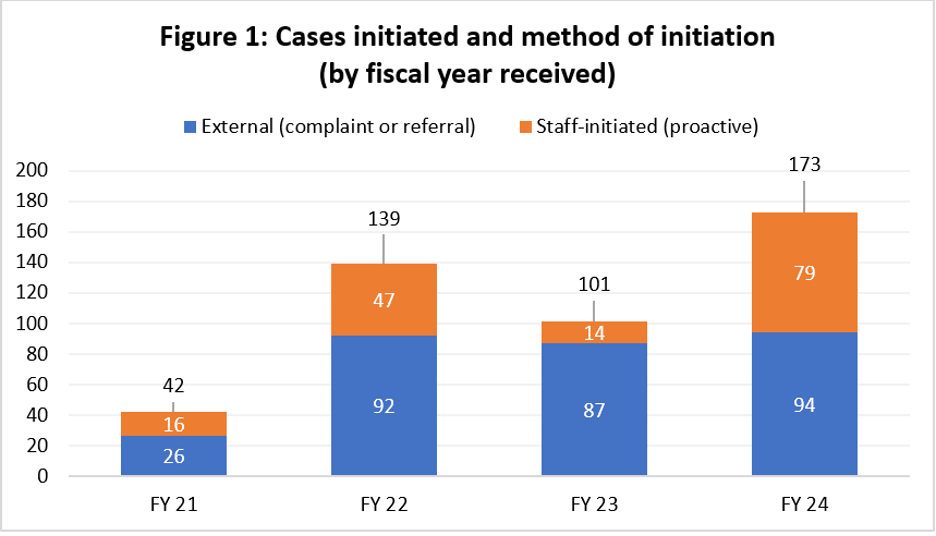
Hearing on the Merits
The Charter authorizes the Commission to conduct hearings on the merits in order to resolve enforcement matters in which the respondent declines to settle. In FY24, the Commission took significant steps to standardize and strengthen this core element of the Commission’s enforcement authority.
- Enhancements to Enforcement Hearing Guidebook: In August, the Commission finalized the checklists attached to the Enforcement Hearing Guidebook, which was published on May 1, 2023. The guidebook summarizes the laws governing the Commission’s processes for determining probable cause and conducting hearings on the merits. The checklists consist of three stages—Stage One, Stage Two, and Stage Three—and further explain and break down the steps that must be completed by each party at each stage of the administrative hearing process. Both the guidebook and the checklists serve as tools and resources to assist the Commission, respondents, and the public in understanding the legal procedures that allow the Commission to assess evidence and determine whether a violation has occurred. Both resources allowed the Commission to conduct a smooth and efficient full hearing on the merits in FY24.
- Regulation Review Initiated: Although the Enforcement Hearing Guidebook clarifies how the hearing process works, some of the aspects of the Commission’s Enforcement Regulations should be strengthened to provide greater clarity and more streamlined administrative hearings. The Enforcement Division began work in FY24 to analyze the regulations and identify areas for improvement. The full process of studying and recommending changes to the Commission’s Enforcement Regulations is planned for FY25.
Timely and Effective Case Resolution – Statistics
Through the initiatives discussed above, the Commission has steadily improved the rate at which cases advance through the preliminary review stage, investigation, and hearing. As shown in Figure 2, the Commission successfully lowered its average time to complete preliminary reviews to well below the previous four years. At 33 days, this average completion time indicates that the Enforcement Division immediately reviews complaints when they are received and promptly makes an informed decision as to whether or not a full investigation is warranted.
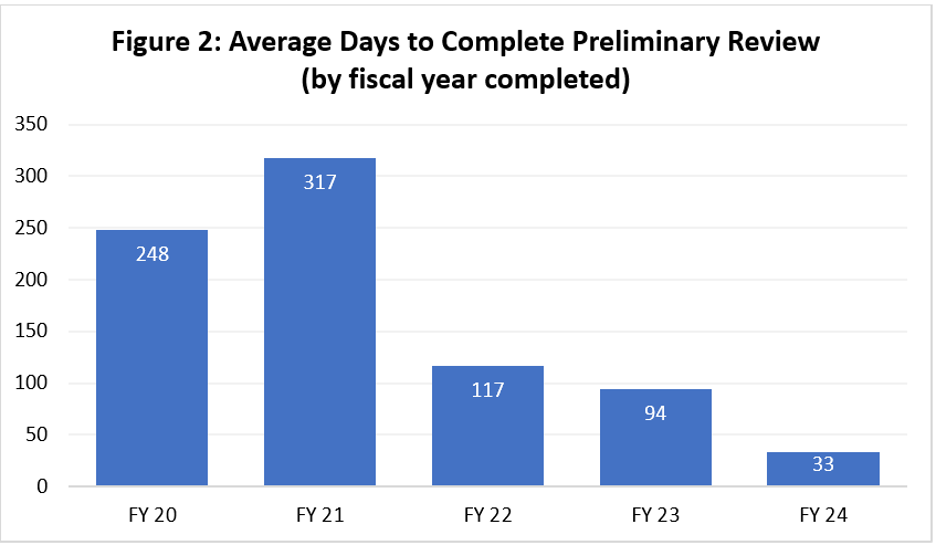
The Division’s increased capacity to handle enforcement matters also resulted in a large number of cases resolved in FY24. In total, as shown in Figure 3 below, the Division resolved 154 cases in FY24. Although this is four cases fewer than the total resolved in FY23 (158 cases), the Division dismissed many fewer cases in FY24 year (57 case compared to 90 cases in FY23). This means that most of the cases reviewed progressed from the preliminary review stage into the full investigation stage. Of the cases that proceeded to a full investigation, 83 were closed following a full investigation into the matters, and 11 of them resulted in penalties, resulting in total penalties of $89,175 being issued in FY24. One of the 11 enforcement action cases included a full hearing on the merits conducted by the Commission, the remaining ten were resolved through settlement.
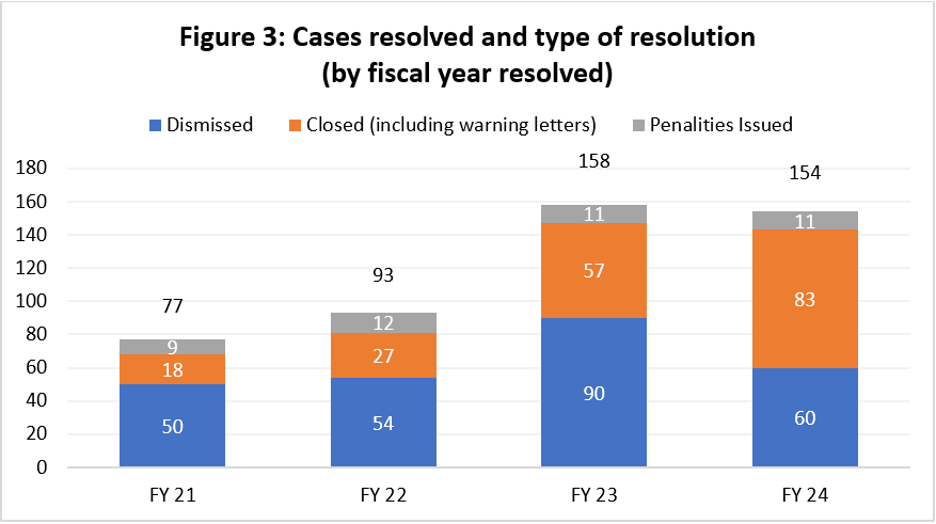
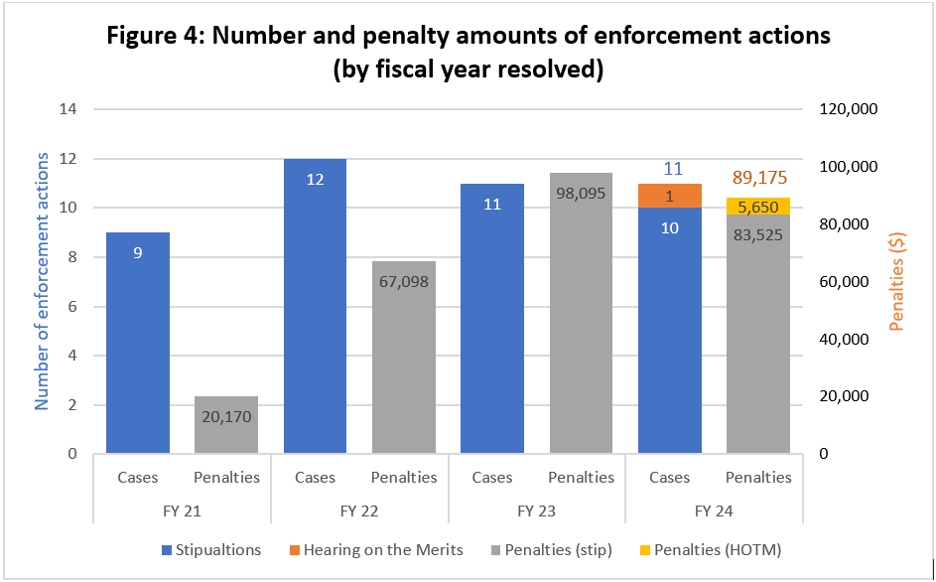
Whistleblower Retaliation
One of the violation types investigated by the Commission is whistleblower retaliation. This violation occurs when a City officer or employee takes an adverse employment action against a City officer, employee, or contractor because that individual engaged in protected whistleblowing activity. The Whistleblower Protection Ordinance requires the Commission to report on whistleblower cases each year.
Below is a summary of the Ethics Commission’s Whistleblower Retaliation activities:
- In FY24, the Commission resolved 14 enforcement matters concerning alleged retaliation, 6 of which had been received prior to FY24. Of these resolved cases, 10 were dismissed in preliminary review and 4 were closed after opening an investigation.
- The Commission received a total of 12 retaliation complaints in FY24.
- This number reflects one of every 17 complaints received by the Commission.
- Additionally, investigators engaged in informal consultations with an additional six individuals regarding potential retaliation allegations.
- These matters did not result in formal complaints being filed because they were either anonymous or outside of the Commission’s jurisdiction.
The Commission imposed no administrative penalties in retaliation matters during FY24. Given that the Commission’s investigations did not find retaliation violations in FY24, information about disciplinary actions that may have been taken by the departments as a result of those complaints was not solicited.
During FY24, the adverse employment actions alleged to have been taken against employees identifying themselves as whistleblowers included:
- Being treated unprofessionally and incorrectly removed as a recipient of CalWORKS/CalFRESH benefits.
- Employer taking long to approve request for time off.
- Employee being terminated for engaging in misconduct to which employee admitted.
- Employee being investigated internally for tampering with IT equipment.
- Employee being served with the mandatory interview notification regarding an argument and physical altercation in which employee was involved.
- Placing employee on administrative leave during an internal investigation.
- Employee being excluded from a position they applied for and for which they ranked on top of the eligibility list.
- Employee being released from their probationary promotional position.
The most common bases for a whistleblower case being dismissed during FY24 were that the complainant was not the subject of an adverse employment action or had not engaged in protected activity as defined by the Whistleblower Protection Ordinance. Many of the adverse actions reported by complainants are not adverse employment actions under the law that can constitute retaliation.
Likewise, the kinds of alleged reporting activity that complainants cited as protected activity often concerned workload or assignment, office policies, or other personnel management issues which are not protected under the law. There is a limited scope of reporting activity that constitutes protected whistleblower activity: only those who report improper government activity, misuse of City funds, deficiencies in the quality and delivery of government services, wasteful and inefficient government practices, or unlawful activity by a City contractor are protected against retaliation under the law.
Campaign Finance Audits
Like the Commission’s enforcement program, audits are a vital way to promote compliance and to ensure accountability for those who do not follow the law. The Commission is required to audit all candidates who receive public funds through the City’s public campaign financing program. City law also empowers the Commission to initiate discretionary audits to identify violations of the laws administered by the Commission.
Completion of 2020 and 2022 Audits
In FY24, the Commission eliminated its backlog of public financing audits. The Commission contracted with the external vendor Macias Gini & O’Connell LLP (MGO) to complete audits of fifteen candidate committees that were awarded public financing in the 2020 and 2022 elections. This contract was executed because the Commission’s Audits Division was not able to complete the audits, which are mandated by City law, and a backlog of audits existed that needed to be completed. The contract was paid out of the City’s Election Campaign Fund, which is the source of funds for the public financing program and may also be used to cover administrative expenses associated with the program.
MGO began its work on the fifteen audits in February, completed its audit work in May, and provided draft audit reports to the Commission in May and June. Committees were then given the opportunity to respond to the draft audit reports. All fifteen audits were finalized and are posted to the audits section of the Commission’s website. All outstanding required audits of publicly financed candidate committees are completed, and there is no audit backlog.
Overhaul of Audit Programs – FY2
As mentioned, the Audits Division was not able to complete the audits for publicly financed candidates for the 2020 and 2022 elections, requiring the third external vendor contract in eight years to complete a backlog of campaign finance audits. The Commission has engaged with stakeholders, including candidates and their representatives, and is committed to improving its campaign finance audit program in FY25. This will involve an overhaul of the division’s protocols, standards, and position classifications, as well as the institution of milestones to guide the progression of audits toward timely completion.
Departmental Operations
Commission Membership and Leadership
There were important changes to the makeup and leadership of the Commission in FY24. In February, Commissioner Theis Finlev was elected chair of the Commission, and Commissioner Argemira Florez-Feng was elected vice-chair. In November, David Tsai was appointed to the Commission by the District Attorney. In February, Karen Bell Francois was appointed to the Commission by the Mayor.
In January, the Commission completed its nationwide search for its next executive director and announced the appointment of Patrick Ford. Pat first joined the Commission in 2017 and previously served as the Commission’s Director of Enforcement and Senior Policy and Legislative Affairs Counsel. Before joining the Commission, Pat practiced law at DLA Piper in Palo Alto. Pat earned his JD from Pacific McGeorge School of Law and his BA from UC Santa Barbara. During the search process, Deputy Director Gayathri Thaikkendiyil served as interim executive director and maintained progress on the Commission’s key initiatives.
Commission Staff Recruitment
The Commission also successfully completed a number of staff recruitments in FY24, including three division managers.
In December, Kyle Kennedy began as the Commission’s next Engagement and Compliance Manager. Kyle previously served as an independent expenditures analyst and as a candidate services liaison at the New York Campaign Finance Board and has experience as a compliance analyst with the Office of the Nassau County Executive. Kyle earned his MA in Intercultural Management from the School for International Training Graduate Institute and his BA from George Washington University.
In May, Bisi Matthews began as the Commission’s next Director of Enforcement. Bisi first joined the Commission as a senior investigator in October 2021. Bisi previously practiced law at Bay Area Legal Aid, the Law Foundation of Silicon Valley, and Manhattan Legal Services and served as a senior special investigator at the Office of the Inspector General for the New York City Police Department. Bisi earned her JD from Michigan State and her BA in Criminal Justice from John Jay College of Criminal Justice in New York.
In May, Cesar Delgado was appointed to the Audit Manager position. Cesar joined the Commission as an auditor in November 2021. Cesar previously served as an auditor with the California Franchise Tax Board and as a political reports specialist with a political law firm.
The Commission also recruited Kevin Kincaid and Ryan Abusaa as Client Support Specialist and Engagement and Compliance Officer, respectively. Staff recruitment will remain a major operational priority in FY25.
Operational Initiatives
In addition to the programmatic initiatives discussed above, the Commission undertook a number of operational improvements to enhance the overall effectiveness of its work. These include:
- Completing the process to extend the contract with NetFile to provide its electronic filing system to the Commission for campaign finance, public financing, lobbyist, campaign consultant, Form 700 reporting and ethics and sunshine training.
- Establishing a contract for a process server to serve subpoenas outside the City & County of San Francisco and establishing an arrangement with the San Francisco Sherriff’s Department to serve subpoenas within the City and County.
- Adding multilingual support to the Commission’s website, enabling the Commission to make available professionally translated, vital public information in Chinese, Spanish, and Filipino.
Departmental Budget
The Ethics Commission’s budget is comprised of two main components—an operating budget to support the department’s programs and operations, and the Election Campaign Fund. The Commission’s annual approved operating budget for FY24 was $7.09 million with 30.56 funded staff positions. The Election Campaign Fund provides a dedicated source of funding for the City’s public campaign financing program. In FY24, the fund had a balance of $4 million.
Departmental budget submissions for the fiscal year beginning July 1, 2024 (FY25) were due to the Mayor’s Office on February 21st. The Mayor’s FY25 budget instructions required departments to propose ongoing cuts of 10% in FY25 and FY26 from General Fund budgets. An additional proposed ongoing contingency cut of 5% was also required in FY25 and FY26.
Following two public hearings at regular Commission meetings, the Commission submitted its FY25-FY26 Budget request to the Mayor’s Office. This request sought to secure continued funding for critical staffing. The proposal also included funding to reclassify positions to support audits, enforcement, and administration functions to improve the effectiveness of the Commission’s programs and operations.
The Mayor’s proposed FY25-FY26 City budget included funding for all of the Commission’s budget requests. Staff presented the Mayor’s proposed budget for the Commission at the Board of Supervisors Budget and Appropriations Committee meeting on June 12th. The Committee directed the Board’s Budget and Legislative Analyst (BLA) to review the Commission’s proposed budget to identify potential cuts. After its review, the BLA recommended cutting all of the Commission’s position reclassifications from the proposed budget in order to achieve savings. Staff appeared at the Committee’s June 21st meeting to recommend against the BLA’s proposed cuts. The Committee indicated that it would maintain the reclassification of four positions in the Audits Division but deny the other reclassifications that the Commission had requested and the Mayor had proposed. The board passed, and the Mayor signed on July 30th, the budget as revised by the Committee.
The FY25 budget that was approved provides for the following reclassifications and hirings:
- Reclassification of all positions in the Audit Division:
- 1824 Principal Administrative Analyst position to 1686 Auditor III
- 1822 Administrative Analyst positions to 1684 Auditor II (three positions)
- Approval to fill other positions which were previously held vacant due to budget constraints:
- 1844 Engagement & Compliance Officer1840 Junior Management Assistant
- 1454 Executive Secretary
The budget does not provide funding for the following position reclassifications that were requested by the Commission in its FY25 proposal:
- Reclassification of three positions in the Enforcement Division:
- Director of Enforcement from 0922 (Manager I) to 0923 (Manager II)
- 1823 Senior Investigative Analyst to 1824 Principal Investigative Analyst (two positions)
- Reclassification of one position supporting operations
- 1840 Junior Management Assistant to 1844 Senior Management Assistant (the position will be hired as 1840 Junior Management Assistant, as noted above)
The Commission’s budget proposals and related documents are available on its website.
Racial Equity Plan
Each City department is required to develop and maintain a Racial Equity Action Plan to capture information regarding their racial equity goals. This includes actions planned, resources committed, indicators of progress, and timelines. Departments are also required to submit progress reports annually to the City’s Office of Racial Equity (ORE) on their racial equity efforts.[2]
With a commitment to developing a diverse and equitable leadership team that will foster a culture of inclusion and belonging, the Commission in its Racial Equity Action Plan identified an action to incorporate its senior leadership’s demographics in the department’s annual report. In alignment with that goal, the current demographic information is provided below.
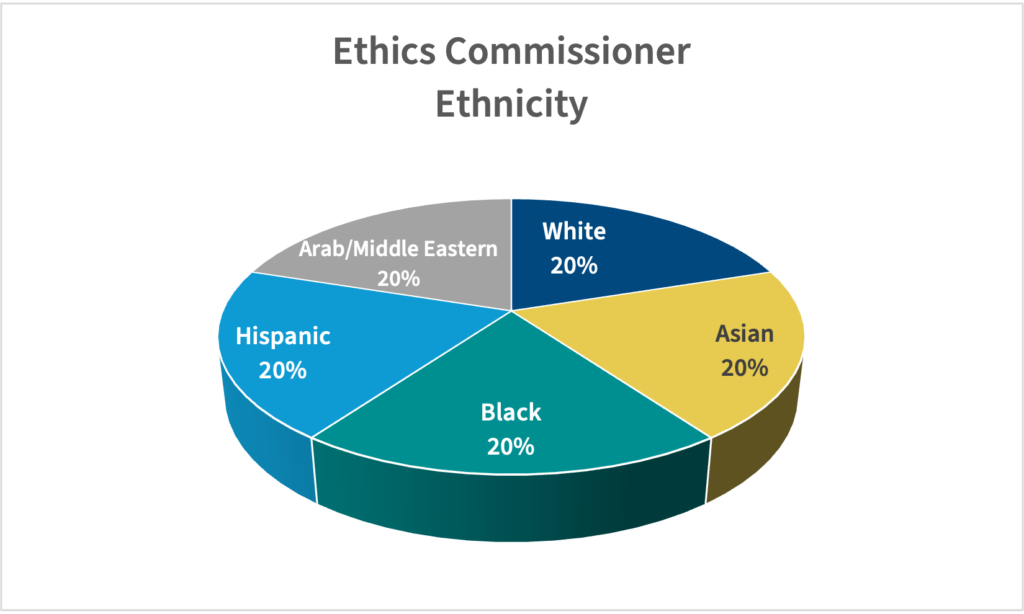
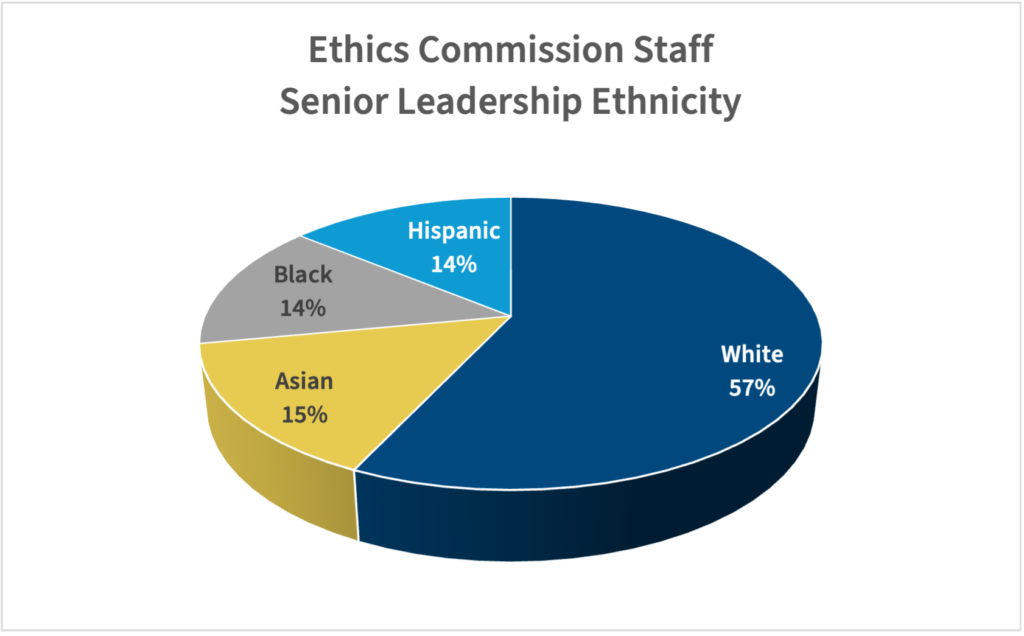
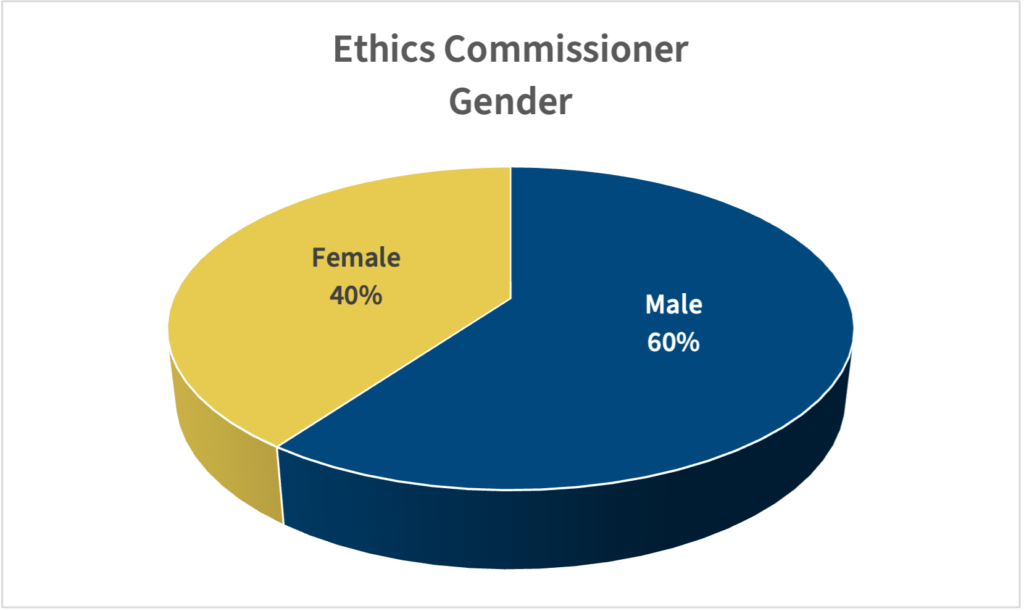
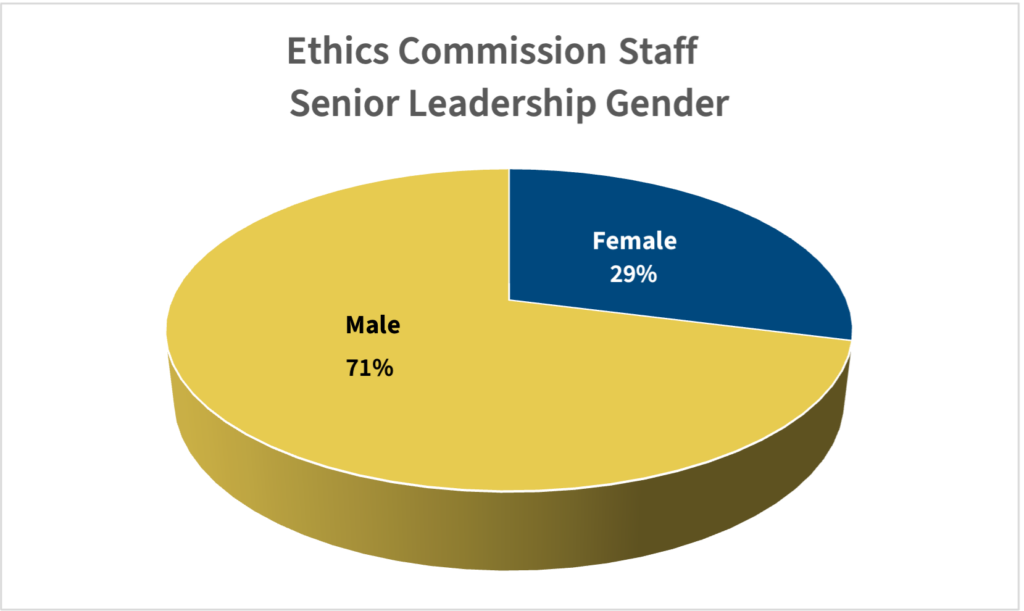
[2] During FY24, the Ethics Commission submitted its Progress Report to ORE in May 2024. Additional information regarding the Commission’s Racial Equity Action Plan is available on its website.
Major Goals for FY25
The Commission is poised to make many advancements in its work in FY25. The initiatives in the coming fiscal year will seek to further improve the breadth, efficiency, and timeliness of the Commission’s operations. Some of the major projects that are planned for FY25 are:
- Program Analysis and Revitalization – The Commission intends to study and make improvements to several programs. These will likely include the lobbyist and permit consultant disclosure programs, the Streamlined Administrative Resolution Program (SARP), and the Enforcement Regulations.
- Conducting Thorough and Timely Audits – The Commission will overhaul its audits program with the goal of completing campaign finance audits from the 2024 election no later than the end of FY26. This will require significant work in FY25 to recruit four auditor positions, establish new audit protocols, develop a new audit tracking system, deploy a new electronic audit document sharing platform, and perform extensive audit work.
- Enhancing Public-Facing Information – The Commission will rework much of its website content in order to better inform regulated persons about the law and better engage members of the public seeking to learn about the Commission’s work.
- Standardizing and Documenting Critical Business Processes – Staff will establish many new standard operating procedures that control how the agency processes are carried out. This project will make the Commission’s core functions more standardized and efficient, enable better cross-training and onboarding, and ensure business continuity and consistency over time.
- Recruitment and Onboarding – The Commission will conduct several recruitments during FY25 in order to fill positions newly authorized in the FY25 budget, backfill vacancies, and convert certain positions to permanent civil service. Effective training and onboarding will be a central part of the recruitment plan.